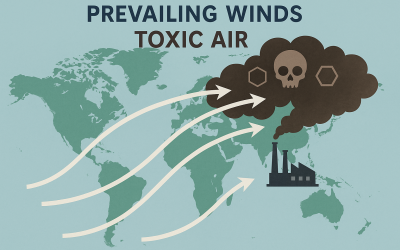Q&A Collection
-
Q: What is air pollution?
A: Air pollution is the presence of harmful substances in the atmosphere such as PM₂.₅, NO₂, CO, ozone, or SO₂ that negatively affect human health and ecosystems. en.wikipedia.org -
Q: How many people die due to air pollution each year worldwide?
A: Approximately 7 million people die prematurely every year due to ambient and household air pollution combined. -
Q: How many deaths are caused by outdoor air pollution alone?
A: Outdoor (ambient) air pollution accounts for about 4.2 million premature deaths annually. ww2.arb.ca.gov+15who.int+15bmj.com+15 -
Q: What portion of the global population breathes polluted air?
A: Around 99% of the world’s population lives in areas where air quality exceeds WHO guidelines. epa.gov+6who.int+6who.int+6 -
Q: Why is indoor air pollution a problem?
A: Indoor pollution from cooking with solid fuels causes about 3 million premature deaths per year. cleanairfund.org+15en.wikipedia.org+15ww2.arb.ca.gov+15 -
Q: What are the main sources of air pollution?
A: Major sources include vehicle emissions, industrial activity, power plants, waste burning, agriculture, and household fuel use. who.int+1epa.gov+1 -
Q: How does air pollution affect children?
A: It contributes to lung infections, asthma, low birth weight, and impaired brain development; causing ~700 000 deaths in children under five in 2021. stateofglobalair.org -
Q: Is air pollution deadlier than smoking?
A: Yes—air pollution causes more premature deaths annually (~8 million) than tobacco. ourworldindata.org+2wired.com+2cleanairfund.org+2 -
Q: Which regions suffer most from ambient air pollution?
A: Low- and middle-income regions—especially South-East Asia and Western Pacific—bear 89% of outdoor pollution deaths. timesofindia.indiatimes.com+15who.int+15scied.ucar.edu+15 -
Q: What health conditions does air pollution cause?
A: It increases risks of stroke, heart disease, COPD, lung infections, and certain cancers. en.wikipedia.org -
Q: How many deaths are linked to fossil-fuel pollution?
A: About 5.13 million excess deaths per year are attributable to fossil-fuel-related ambient air pollution. bmj.com -
Q: What is PM₂.₅ and why is it dangerous?
A: PM₂.₅ refers to fine particulate matter under 2.5 micrometers that penetrate deep into lungs and bloodstream, causing major diseases. -
Q: What can individuals do to reduce indoor air pollution?
A: Use improved cookstoves, ventilate kitchens, install chimneys, and educate communities on safer practices. en.wikipedia.org+1en.wikipedia.org+1 -
Q: Which simple actions help reduce outdoor pollution?
A: Walk or bike, use public transit, limit idling, refuel after dusk, and avoid gas-powered equipment. airnow.gov -
Q: How can we cut industrial and power plant emissions?
A: Implement scrubbers, phase out coal, enforce emissions limits, and invest in renewables. -
Q: How effective are Clean Air Acts?
A: In the U.S., the Clean Air Act reduced common pollutants by 78% between 1970–2020 and saved many lives. epa.gov -
Q: How can students help fight pollution?
A: They can raise awareness, participate in tree-planting, advocate for greener city planning, and engage via eco-clubs. cleanairfund.org+15scied.ucar.edu+15timesofindia.indiatimes.com+15timesofindia.indiatimes.com -
Q: What are “oxygen banks” and Miyawaki forests?
A: These are dense, fast-growing forests planted to improve air quality in urban areas like Varanasi. timesofindia.indiatimes.com+1timesofindia.indiatimes.com+1 -
Q: What are Clean Air Zones?
A: Areas that restrict high-emission vehicles to reduce urban pollution, such as those planned in Vijayawada and Visakhapatnam. timesofindia.indiatimes.com -
Q: How does wildfire smoke impact air quality?
A: Smoke can push AQI above 150 (“very unhealthy”), requiring masks and indoor air purification. apnews.com -
Q: Are air purifiers helpful?
A: Yes indoors on high AQI days—but they may be costly and cover limited space. -
Q: How many deaths could EU emission cuts prevent?
A: Up to 250 000 premature deaths by 2050 in central and western Europe with aggressive emissions policy. cleanairfund.org+6time.com+6apnews.com+6 -
Q: What global policies help fight air pollution?
A: Clean Air Acts, vehicle emissions standards, clean cookstove programs, transit investments, and green energy policies. who.int -
Q: How can communities take collective action?
A: Through city lobbying, demanding public transport, organizing clean-up drives, and pushing for regulations. -
Q: How do personal habits affect air quality?
A: Choices like driving less, conserving energy, using electric equipment, and proper car maintenance all reduce pollution. -
Q: How can governments enforce clean air?
A: By enacting emissions caps, monitoring air quality, imposing fines, and incentivizing green tech. -
Q: Can planting trees really help?
A: Yes—urban afforestation (like Miyawaki forests) removes pollutants, improves temperature, and boosts air quality. -
Q: What technology helps cities monitor pollution?
A: IoT sensors, community monitoring networks like PurpleAir, and portable detectors in homes/schools. apnews.com -
Q: What is household cooking’s role in pollution?
A: Using biomass fuels without ventilation causes harmful indoor smoke—leading to ~3–4 million deaths annually. en.wikipedia.org+1en.wikipedia.org+1 -
Q: How to advocate for cleaner air locally?
A: Sign petitions, attend public hearings, join eco-clubs, and support environmental youth campaigns. -
Q: What role do clean cookstoves play?
A: They reduce smoke output by improving combustion efficiency—cutting indoor pollution significantly. -
Q: How does energy conservation help air quality?
A: Using less energy lowers the need for fossil-fuel generation, thus reducing emissions. -
Q: What’s the link between air pollution and climate change?
A: Fossil-fuel combustion emits both health-harming pollutants and greenhouse gases—so cutting one helps the other. en.wikipedia.org+12earth.org+12scied.ucar.edu+12 -
Q: How can industry support cleaner air?
A: By adopting scrubbers, switching to renewables, improving efficiency, and releasing emissions data publicly. ourworldindata.org+15scied.ucar.edu+15who.int+15 -
Q: Can remote sensing help pollution research?
A: Satellites and IoT sensors map pollutants and guide policy—a growing tool in air quality monitoring. (implied from tech references) -
Q: How do low emission zones work?
A: They restrict polluting vehicles in city centers, improving air quality—as in London’s ULEZ. time.com+7vox.com+7thetimes.co.uk+7thetimes.co.uk -
Q: What is the WHO doing about pollution?
A: They set guidelines and support countries with tools, policy advice, and data monitoring. -
Q: What can schools do to fight pollution?
A: Teach students about climate, run eco-missions, plant trees, and lobby for cleaner buses. -
Q: Why combine climate and pollution policies?
A: Since fossil fuel cuts reduce both CO₂ and pollutants, integrated strategies yield bigger health gains. -
Q: What everyday appliance choices help?
A: Opting for energy‑star appliances, insulating homes, and avoiding gas heating reduces emissions. ww2.arb.ca.gov -
Q: How should people respond on bad air days?
A: Stay indoors, use purifiers or N95 masks, avoid exertion, and monitor AQI. apnews.com+1scied.ucar.edu+1 -
Q: How much global lifespan is lost to pollution?
A: Average life expectancy is cut by about 2–2.9 years worldwide due to air pollution. -
Q: Is pollution worse in heat waves?
A: Yes—ozone forms faster in heat and fires worsen particulate levels, doubling health risks. (implied from wildfire smoke coverage) -
Q: How has EU reduced deaths from pollution?
A: Through clean policies—EU Clean Air Program prevented an estimated 250 000 deaths by 2050. -
Q: What role does agriculture play in pollution?
A: Crop burning emits particulates; sustainable farming and no-burn policies help reduce it. -
Q: How to discover major polluters nearby?
A: You can search by address at “Find Polluters Near Your Home”: https://www.pollutersnearme.com/polluters-near-me/ -
Q: What are CityTrees?
A: Vertical green installations covered in moss that filter air using IoT tech—used in cities for local pollution relief. en.wikipedia.org -
Q: How can urban design reduce pollution?
A: Better public transport, bike lanes, green zones, and clean pockets like oxygen banks improve conditions. timesofindia.indiatimes.com -
Q: Why is pollution not always listed on death certificates?
A: Because it’s an underlying factor—only one such case was officially recorded (Ella Adoo‑Kissi‑Debrah in 2020). cleanairfund.org -
Q: How can young people become change-makers for cleaner air?
A: By joining eco-clubs, taking monthly missions, organizing outreach, and influencing policy—all proven effective in Delhi. timesofindia.indiatimes.com




0 Comments